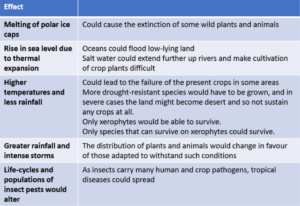The concentrations of the greenhouse gases may be very small, but they are increasing. The result of these increases is the enhanced greenhouse effect, which is causing more heat to be trapped on Earth, leading to an increase in mean global temperature called global warming.
Effects of Global Warming
Global warming is expected to bring about changes in temperature and precipitation, the timing of the seasons and the frequency of extreme events such as storms, floods and drought.
Climate change will affect the niches that are available in a community. As each organism is adapted to a particular niche the distribution of species will alter. If the rate of climate change is slow, species may have time to gradually migrate to a new area where they will compete for available niches.
This could lead to the loss of native species that occupy those niches. Some species may be able to survive in their current locations by adapting to different food sources.
We can determine the age of fossils by measuring the amount of radioactive decay of an isotope of carbon. Fossil shells from beneath ocean beds contain oxygen isotopes as well. The proportion of these oxygen isotopes reflects the proportion of them in the sea water at the time the organism took them into its shell.
When ice forms, air bubbles become trapped in it. The deeper you drill into ice, the older is it. The air bubbles in the ice will reflect the composition of the atmosphere at the time when the ice was formed.

